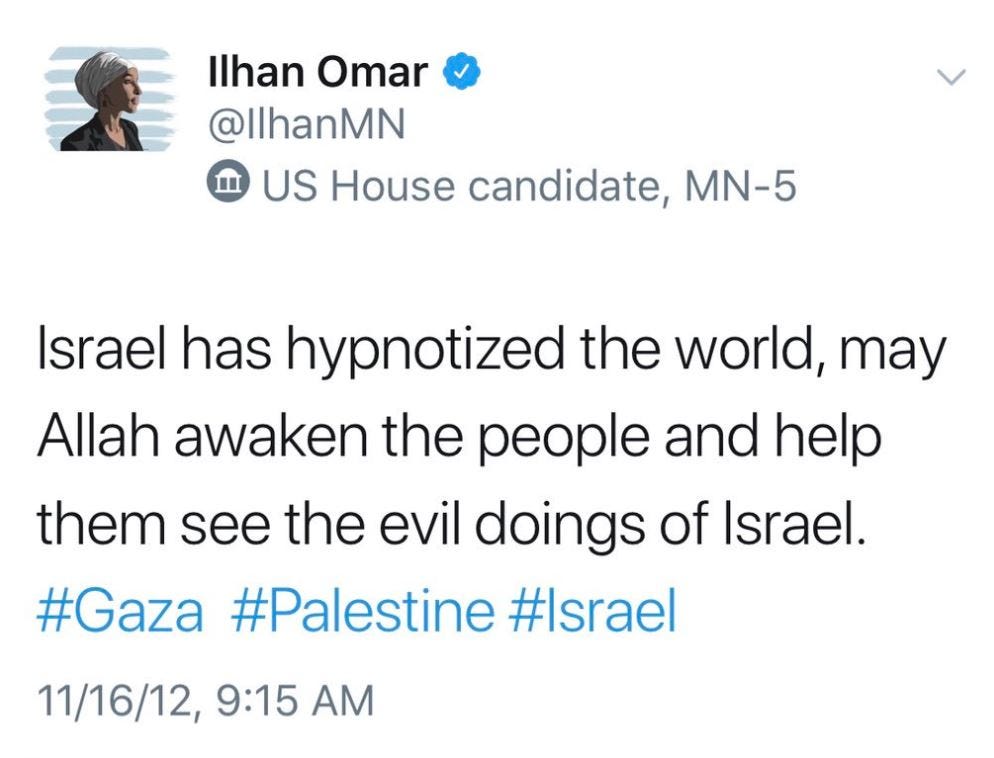By Kent R. Kroeger (Source: NuQum.com; November 14, 2018)
Late Palestinian writer Edward Said once said Muslim women would lead the Islam into the 21st-century.
Said’s prediction may not have yet materialized in the Islamic world, but his words echoed in my head with the election of two Muslim-American women to the U.S. House last Tuesday. Among the many ‘firsts’ coming from the midterm elections, their election victories may have the most substantive impact.
Palestinian-American Rashida Tlaib (D-Michigan), a social worker and the daughter of Palestinian immigrants, and Somali-American and former refugee Ilhan Omar (D-Minnesota) are both Democrats and poised to upend the status quo in the Democratic Party.
From both sides of the political establishment, the long knives were drawn against Tlaib and Omar before they were even elected.
Rashida Tlaib
Rep.-elect Tlaib’s initial apostasy occurred when she seemingly changed her opinion on U.S. policy regarding the Israeli-Palestinian conflict, suggesting that the two-state solution is a failed project (it is) and that the one-state solution, where Israel officially annexes the West Bank and Jews and Palestinians live together as full citizens, is now the only just and viable option (also true).
Responding to a reporter’s question after she won the Democratic nomination for the U.S. House seat, Tlaib said: “One state. It has to be one state. Separate but equal does not work. I’m only 42 years old but my teachers were of that generation that marched with Martin Luther King. This whole idea of a two-state solution, it doesn’t work.”
However, some Israelis and pro-Israel Democrats claim Tlaib has either changed her opinion or deliberately misled them.
According to the Israeli paper Haaretz, a senior adviser to Tlaib, Steve Tobocman, told the paper prior to the primary that she supported a two-state solution, as well as current U.S. aid levels to Israel and the Palestinian Authority.
Whether Tlaib’s opinion shift was calculated or simply a misunderstanding, the Democratic Party’s pro-Israel lobbyists did not take long to respond.
“J Street will not endorse candidates who don’t endorse the two-state solution,” announced the Democrat-aligned lobbying group. “After closely consulting with Rashida Tlaib’s campaign to clarify her most current views on various aspects of the Israeli-Palestinian conflict, we have come to the unfortunate conclusion that a significant divergence in perspectives requires JStreet PAC to withdraw our endorsement of her candidacy.”
The New York Times wondered out loud if Tlaib, along with Omar, and Alexandria Ocasio-Cortez (New York) might represent a trend among newly elected Democrats to more aggressively question the party establishment’s uncritical support of Israel and their stale ideas on how to resolve the Israeli-Palestinian conflict.
Under pressure from party leaders, Ocasio-Cortez has backpeddled somewhat from earlier criticisms she made regarding Israel’s treatment of Palestinians, but Tlaib and Omar have not. Nonetheless, the Times article ultimately concluded Congress’ iron-clad support for Israel is not threatened by these Democratic Party newcomers. In an age of extreme partisanship in U.S. politics, it is remarkable at the unanimity of opinion between the Democratic and Republican parties regarding Israel.
“We’re talking about a handful of people,” Ronald Halber, director of the Jewish Community Relations Council for the Washington, D.C. area, was quoted as saying in the Times article. “They’re certainly not going to move Congress’s wall-to-wall support for Israel.”
Still, Tlaib’s mere suggestion that a one-state solution remains the only viable option left has aggravated the Democratic and Republican political establishments. And, despite 80 years of failure in implementing a workable two-state solution, the fact that mainstream foreign policy experts consider a one-state solution a ‘radical’ idea exemplifies their general lack of creativity and relevance.
The one-state solution train has already left the station, as evidenced by the passing of Israel’s new law officially recognizing Israel as the Jewish homeland and effectively creating a legal wall of separation between Israeli Jews and non-Jews that will keep Palestinians in a second-class status should Israel annex the occupied lands.
Tlaib’s support of the one-state solution was simply acknowledging what is already becoming a reality on the ground. Her concern has therefore turned to ensuring that Palestinians attain full citizenship rights when this solution is implemented.
Yet, if Tlaib’s criticism of Israeli policies towards the Palestinians were her only heresy, she could easily be dismissed as someone biased by her ethnic and cultural heritage. Instead, she is far more balanced and realistic in her thinking on Israel, to the point where she has many critics on the progressive left as well.
For starters, she bristled at criticisms from Palestinian activists over her original J Street endorsement (which was subsequently withdrawn over her one-state stance). “Palestinians are attacking me now, but I am not going to dehumanize Israelis,” she said. “I won’t do that.”
Tlaib further aggravated some on the progressive left with her nuanced opinion regarding the boycott, divestment and sanctions (BDS) movement. While she supports the right of Americans to voice their opposition to Israeli policies towards Palestinians through the BDS movement (something the U.S. House will likely be voting on in this next term), she has purposely distanced herself from some of its tactics. Her non-conformity with progressive left orthodoxy has not gone unnoticed and might aid any attempt by the Democratic Party establishment to isolate her should they decide it is necessary.
In that regard, Tlaib casts a similar image to Representative Tulsi Gabbard (D-Hawaii), who is not shy about criticizing her own party’s leadership or ideologues on the progressive left.
Gabbard, a consistent supporter of Israel, has nonetheless criticized specific Israeli actions and policies over her congressional career, such as Israel’s expansion of West Bank settlements and strong support for a U.S.-led regime change war in Assad’s Syria.
Tlaib shows every indication that she will confront her own party when she needs to do so — which is not good news for Nancy Pelosi’s upcoming struggle over the next two years in keeping the party unified.
Ilhan Omar
Rep.-elect Omar, who will be replacing Keith Ellison in the House, is a more typical progressive in comparison to Tlaib. Her soft, striking beauty belies a prickly, sharp-edged personality that is direct and often combative.
An immigrant herself, she made U.S. immigration policy under Donald Trump a centerpiece of her campaign, including a call to abolish Immigration and Customs Enforcement (ICE):
“Our immigration system is fundamentally unjust. Instead of extending humanity and compassion to migrants and refugees, we treat them as criminals,” she posted in a statement on her campaign website. “ICE is an unreformable organization that has become increasingly militarized, brutal, and unaccountable. However, we must not simply revert back to the immigration system that preceded ICE. We must welcome immigrants into our country and provide them simple and accessible means to becoming documented.”
Sharp, blunt and uncompromising.
Unsurprisingly, Omar’s sharpest critics are on the political right, who as of late like to chide the Democrats for name-calling and character assassinations (think: Brett Kavanaugh). Unfortunately, the political right has never shied away from using these tactics themselves, as witnessed in their scathing, personal, ad hominem attacks on Omar.
Their ugliest slur against Omar has been to call her an ‘anti-Semite,’ citing her past statements such as the following tweet in 2012:
The language(s) we speak affect how we view the world and how others view us. For example, when they translate linguistic norms and idioms into rough English equivalents, bilingual Arabic speakers are often misinterpreted by English-only speakers.
In other words, according to Raymond Cohen, professor of international relations at Hebrew University of Jerusalem, “communal life is possible only because members of a community possess a set of shared meanings, enabling them to make coherent sense of the world.”
“While it is legitimate for English speakers to use their native-language paradigm as a baseline against which to measure non-English versions, speakers of other languages are equally entitled to consider their own paradigms as normative,” concludes Cohen.
I read Omar’s above tweet about Israel as relatively benign and consistent with mainstream criticisms of Israeli policies towards Palestinians.
Not everybody, however, interprets Omar’s comments that way.
The entertaining and often thought-provoking Steve Deace, a conservative radio host based out of my home state of Iowa, enjoys serving as an expositor of Omar’s public statements. While he has echoed calls for more civility from both sides of the political spectrum, he does not extend that olive branch to Omar [Nor would she accept it, I suspect].
“This woman is an open anti-Semite,” he declared last week on his TV-radio show simulcast, suggesting her pro-Palestinian activism is nothing but a cover for a deep-seeded enmity towards the Jewish religion. When offering evidence of Omar’s anti-Semitism, he usually cites her November 2012 tweet (above).
So much for Deace’s eschewing the use of name-calling. Labels like ‘anti-Semite’ and ‘racist’ are easy to toss around and convenient cudgels in cases where someone wants to end all constructive dialogue with a political opponent. Democrats are no better, of course, doing the same thing when they call Trump supporters ‘racist.’
Beyond the petty name-calling, more harmful is Deace’s reinforcement of the dialogue-impeding insinuation that criticism of the State of Israel’s policies with respect to the Palestinians is, de facto, an expression of anti-Semitism.
Of course, that is not true.
Even Omar’s November 2012 tweet condemns the ‘evil doings’ of Israel, not the Israeli state itself. In fact, Omar’s views on Israel exist firmly within the boundaries of the mainstream progressive left — which is fair game for criticism, not on the grounds that it is latent anti-Semitism, but on the merits of its policy rationale.
Yes, anti-Semitism is all too real, as recent events in the U.S. can attest. But it bears repeating: criticism of Israel is not sufficient evidence to call someone anti-Semitic. [British academic Ahmad Samih Khalidi, writing for The Guardian, offers a much better discussion on this topic here.]
Echoing many in the American political establishment, Deace’s contention that the progressive left provides cover for latent anti-Semitism among some of its members is misleading and unenlightening.
For example, the Reverend Louis Farrakhan, who is not a member of the progressive left, is openly anti-Semitic. That is an easy call.
In contrast, Omar is a devout Muslim critical of the Israeli government’s treatment of Palestinians. There is a vast chasm between the views of Rev. Farrakhan and Omar and that divide deserves recognition. If anything, it is the small pocket of virulent anti-Semitism residing in the darkest corners of American conservatism that seems far more alarming than anything found on the progressive left.

Ironically, it is commentators from the Israeli political media that are more clear-eyed about the political rise of Omar and Tlaib. Times of Israel columnist Ramon Epstein keenly summarizes the conflict between the pro-Israel Democratic establishment and Reps. Tlaib and Omar:
“The rapid advance of democratic socialism and far left confrontational politics is displacing a calcified and failed establishment class. A significant proportion of this youthful grassroots movement opposes Israel on many policy issues, and stands logically on the side of the Palestinian activist community that as many of you are well aware has taken college campuses by storm throughout the USA,” writes Epstein. “Depending on the geriatric pro-Israel left to eventually ‘right the ship’ in the Democratic Party means depending on the empty threats of Alan Dershowitz, incompetent leadership from Chuck Schumer, and the Orwellian censorship of the Anti-Defamation League. In short — a losing playbook.”
Epstein is not a fan of the progressive left’s growing comfort level with rebukes of Israel, but he sees it for what it is (an anti-establishment movement) and what it is not (overt anti-Semitism).
Taking Epstein’s thesis to its logical conclusion, the Democratic Party’s aging and entrenched congressional leadership will struggle to hold the party together with the rise of progressives like Tlaib, Omar and others in the party’s left flank, such as Ocasio-Cortez and Gabbard.
If Edward Said were still alive, he would not be surprised to find Omar and Tlaib becoming two of the most vocal and impactful members in the U.S. House going forward.
- K.R.K.
